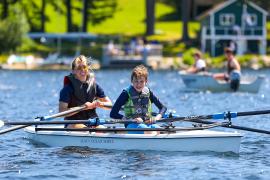Five years had passed since I last worked at my overnight camp when suddenly in summer 2021 my dream opportunity arose: I was going to return to my childhood camp to join the community care team.
As a graduate student in clinical psychology who absolutely loves camp, this role would allow me to merge two of my passions. It was even more meaningful considering the amount of support our campers would need after a year and a half of the Covid-19 pandemic. Together with my colleagues, we anticipated and prepared for the ways that our campers may struggle throughout the summer.
As expected, many campers presented with emotional and behavioral challenges. Yet we were prepared, and I felt we were able to meet their needs. What I was not prepared for was the amount of support that our staff required.
Understanding the Camp Counselor Experience
My experiences working closely with camp staff in summer 2021 inspired me to conduct a qualitative study in summer 2022. I conducted Zoom interviews with 10 camp counselors from a variety of summer camps — day camps, overnight camps, institutionally affiliated camps, independent camps — across the US. Many themes emerged, but the most troubling theme was the extent of burnout that camp counselors were experiencing.
This was especially pronounced in the camp counselors I spoke to who had worked at overnight camps. As many of us know from our own experiences, working at an overnight camp is demanding! As one interviewee put it: “It's not just fun and games, you know what I mean? . . . On a day to day, you're dealing with like 10,000 issues and you're hot and you're hungry and you’re tired and you have to keep going.” When asked how burnout presented, responses differed. One interviewee spoke about having a short temper with his campers, another spoke about being exhausted, and yet another shared that she became physically ill. Burnout has consequences that can negatively affect camp counselors as well as their campers.
Creating the Camp Counselor Burnout Scale (CCBS)
After realizing the extent of burnout among overnight camp counselors, I decided to create the Camp Counselor Burnout Scale (CCBS). With support from my faculty advisor, Jean Rhodes, PhD, and my research colleague, Rob Lubeznik-Warner, PhD, we collected data from hundreds of overnight camp counselors between the ages of 18–25 in summer 2023. Through our research we were able to create the CCBS: a nine-item self-report questionnaire that captures experiences of burnout among overnight camp staff. In addition to calculating a total burnout score, the CCBS also provides scores for the three domains that comprise burnout: (1) feelings of energy depletion or exhaustion; (2) increased mental distance from one’s job, or feelings of negativism or cynicism related to one’s job; and (3) reduced professional efficacy (WHO, 2019).
Why Use the CCBS?
The CCBS is now publicly available in both a printable version as well as a digital version, both of which are free. If you work with staff at an overnight camp, please consider utilizing the CCBS in summer 2024. Administering this questionnaire will help you identify which staff may require more support. Additionally, the domain scores will help you pinpoint more specifically how burnout is presenting in each staff member and, therefore, which types of interventions may be appropriate.
One way to utilize the CCBS would be to administer it to all staff at predetermined points throughout the summer, such as at weekly staff meetings or during transition times between sessions. Another option would be to administer the CCBS as needed, allowing supervisors to decide when and with whom they think it would be useful.
To access the CCBS and learn more, visit sites.google.com/view/camp-counselor-burnout-scale/.
Additionally, please feel free to reach out to me, monica.arkin001@umb.edu, if you’d like to discuss the CCBS and how it could support your camp operations this upcoming summer.
This blog was written on behalf of Project Real Job whose purpose is to support camps in their efforts to recruit, hire, and retain staff.
Monica Arkin (MA) is a doctoral candidate in clinical psychology at UMass Boston. Her clinical work with children and youth has informed her research interests in adversity, resilience, and the value of healthy mentoring relationships for children. Having worked in camp settings as a counselor, supervisor, and mental health clinician, Monica’s current research investigates well-being in summer camp contexts. Monica can be reached at monica.arkin001@umb.edu.




